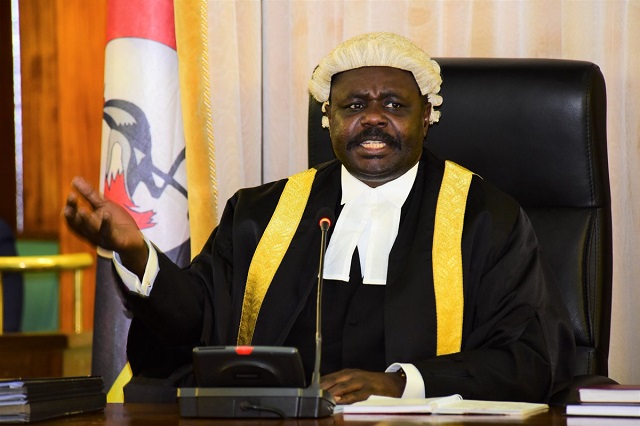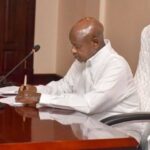On July 1, the Shadow Cabinet asked the Speaker of Parliament to recall the House so that they can debate response measures by the government to the pandemic, citing gaps that need the intervention of the lawmakers. The legislators say they must be involved in the decision making process as the country battles the second wave of the pandemic that has overwhelmed the health system and wiped out livelihoods.
Parliament closed for two weeks following an increase in Covid-19 cases among Members of Parliament and other parliamentary workers.
The closure was communicated in a June 22 letter by the Deputy Clerk Henry Waiswa. According to the letter, this was to enable fumigation of the premises as a measure to fight the spread of Covid-19.
However, recently the media reported that nearly 200 MPs and their staff had tested positive for the virus.
MPs are expected to resume on July 11, but many MPs say the two week break has created a backlog in government business.
The law
Lawyer Noah Muwanguzi explains that the closure of Parliament premises does not mean the House has been prorogued, or ended a session without dissolving Parliament. Only after consultation with the President can Parliament be closed.
Article 95 of the rules of procedure of Parliament empowers the Speaker of Parliament to determine when and where Parliament sits.
In a tweet, Opposition Chief Whip John Baptist Nambeshe said, “Following a discussion with the Deputy Speaker of Parliament, it was agreed that Parliament business would be conducted through digital platforms for two weeks starting Monday June 28 to give room for fumigation in the containment of coronavirus.”
Lawmakers who spoke to this publication, however, said this has not been done as the Deputy Speaker has not designated any other place. Efforts to reach Deputy Speaker Anita Among, who is currently overseeing the House, were futile as calls to her known numbers went unanswered.
Business affected
By the time of closure, representatives in the 11th Parliament had only held one plenary session on top of the statutory sittings for the Budget speech, State-of-the-Nation address, election of the Speaker and Deputy and vetting of Cabinet, two months after taking oath of office.
Majority of these were convened at the Kololo Independence Grounds in observance of the social distancing guidelines.
Mr Ibrahim Ssemujju Nganda, the former Opposition Chief Whip and MP for Kira Municipality, told this publication that whereas Parliament usually goes for recess after the reading of the Budget, the break came before constituting of committees that handle most of Parliament business, and as such, no business can be conducted
The Parliamentary Commission, the administrative arm of the House, is also yet to be constituted.
“Parliament is not yet fully constituted. As I speak to you, there are no committees. We have a committee on health, it should be doing its work but it is not there and maybe the Speaker was stuck and just put something in place…you begin putting things that are illegal,” Mr Ssemujju said.
“The business committee determines the calendar of Parliament, all chairpersons of other committees sit on the business committee. These chairpersons are not yet in place and so even the business committee is not there. Only the Opposition has appointed the LoP [Leader of Opposition] and commissioner and that is why you see the Speaker running everything.”
Parliament is still waiting on Government Chief Whip Thomas Tayebwa to name committee chairpersons. Efforts to reach Mr Tayebwa were futile as repeated calls went unanswered.
Request
Leader of Opposition in Parliament Mathias Mpuuga has requested Mr Tayebwa to expeditiously constitute committees so that the legislative arm of government can ably play its oversight role.
“Yesterday I talked about the failure of the [NRM] party to come to Parliament and designate members of the committees, including those key in scrutinising expenditures. Here we are, the government justifying their expenditures using Covid-19,” Mr Mpuuga says. “I want to know their plans on these areas that government is supposed to settle.”
Some legislators say their mandate is being limited to sensitisations of the citizenry on the coronavirus disease.
“We have alternative ideas on the relief fund programme that we also want to be considered and get incorporated to have our people’s concerns captured,” Ms Fortunate Nantongo, the shadow minister for Gender, says.
“In the initial days of the closure of Parliament, I delivered soap and safety gears to business communities, various police posts and bodaboda stages as I sensitised them about the need to fight Covid-19. I have since resolved to deliver my messages through radios and community announcers,” says Mr Godfrey Wakooli, MP Butiru County.
Making laws
The process of making laws, especially Acts of Parliament, has been greatly affected, Mr Muwanguzi says. Sometimes Parliament may delegate its power of making laws to subordinate bodies. This is done during a crisis, or whenever it is required to save time.
However, some of the parliamentary functions can’t be delegated. For instance, the government can only get a supplementary Budget approved by Parliament.
The State Minister for Finance in charge of General Duties, Mr Henry Musasizi, says they will only implement funds catered for in the previous Budget.
“We have not received any concerns from any party about the need to capture their concerns on the matter. So what we are doing currently is the right process,” Mr Musasizi says.
“We are going ahead to implement the plans and relief process and the money we are using is the three per cent of the supplementary budget that was passed.”
Reducing numbers
As she presided over her maiden sitting, Deputy Speaker Among told MPs that they would access Parliament in turns to reduce the number in the House. Parliament has more than 1,000 MPs and staff.
Former Speaker Rebecca Kadaga in the previous Parliament introduced the policy, directing lawmakers to attend plenary and do committee work in turns. However, this was abused.
“Some of our colleagues would abuse that provision because they constantly come to Parliament, something that defeated the purpose of limiting numbers,” Mr Gerald Ibanda Rwemulikya, the Ntoroko County MP says.
***Daily Monitor***
![]()
























